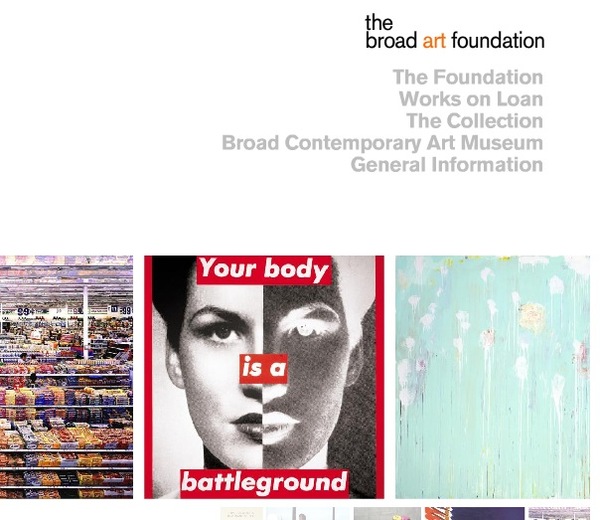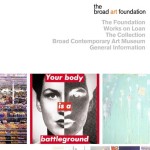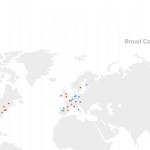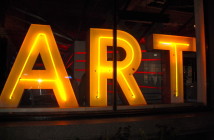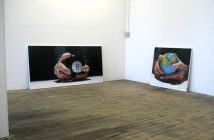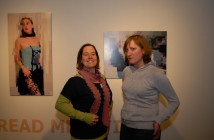Over the past four decades, Eli and Edythe Broad, noted Los Angeles philanthropists and art collectors, have amassed one of the largest collections of postwar and contemporary art in the world. Their two collections, The Eli and Edythe L. Broad Collection and The Broad Art Foundation are comprised of approximately 2,000 works of art by over 150 artists.
The Broad Art Foundation operates as a “lending library” for smaller museums and university galleries. Typically, larger institutions will ignore loan requests by smaller organizations if the exchange is unlikely to yield a financial gain or favorable publicity. The Broad Art Foundation lending library dismantles this hierarchal practice in an attempt to democratize the arts and thus, increase the access of art to audiences worldwide. To date, 400 museums and galleries have benefited from this exchange.
The Eli and Edythe L. Broad Collection, also on permanent loan, differs in that it has been bestowed upon one particular organization, The Los Angeles County Art Museum (LACMA). Located in the heart of Los Angeles, the Los Angeles County Museum of Art has strived to become a world-class art institution since its inception in 1910. The seven-building complex situated on twenty acres is now home to the museum’s collection of 10,000 objects and artifacts. The works of art are rich and diverse in cultural representation and span several historical periods.
Prior to the loan from the Eli and Edythe L. Broad Collection no permanent collection of postwar and contemporary art existed at LACMA. To support this acquisition and celebrate this milestone, the Eli and Edythe Broad Foundation went one step further and donated $50 million to erect an exhibition space now referred to as the Broad Contemporary Art Museum (BCAM at LACMA). Eli Broad hand- picked the renowned architect Renzo Piano to construct an unmistakably glamorous structure predominately comprised of glass and shiny red steel piping. It is a sight hard to miss and so too was BCAM at LACMA’s inaugural celebration. Last February, Hollywood celebrities, politicians, tech-tycoons and blue-chip artists flocked to Los Angeles to view what Eli and Edythe Broad confidently proclaimed to be “some of the most iconic artworks from the last four decades”. A few of the artists represented in the collection are Andy Warhol, Robert Rauschenberg, John Baldessari, Ed Ruscha, Jean-Michel Basquiat, Roy Lichtenstein, Ellsworth Kelly and Cindy Sherman.
Two site-specific installations were also commissioned for the building. An eighty-six foot graphic work by Barbara Kruger adorns the central shaft of the elevator and Richard Serra’s Band and Sequence sculpture engulfs the first floor galleries. By the end of the evening, $5 million was raised for the museum’s capital campaign. This was the largest sum ever raised by a single museum event, an astonishing feat in light of the recent economic downturn. This success has since overshadowed initial criticism of the Eli Broad and the Broad Art Foundation who initially offered to donate, rather than loan the Broad Art Collection to LACMA. A donation constitutes an irrevocable gift, whereas a loan, even a “permanent loan”, does not. With the impermanence of the loan arrangement, one must question: who exactly will control the exhibition and future acquisitions of BCAM?
In 2008, The Broad Art Foundation also changed the fate of another important Los Angeles contemporary art museum. It rescued the Museum of Contemporary Art, Los Angeles (MOCA) from financial ruin by offering a $15 million challenge grant. Broad’s grant prompted the board of MOCA, as well as other philanthropists in town, to support MOCA. To date, Broad has invested $30 million, but perhaps more interesting is his involvement in MOCA’s long-term projects. Broad admittedly influenced the restructuring of MOCA’s board of directors and administrative staff, specifically the appointment of notorious New York art dealer, leading galleryist and thirty-year independent curator Jeffery Deitch as the new director of MOCA on January 12, 2010. Deitch’s appointment is one of controversy, based on the fact that he not only lacks museum administrative experience but he has also had a vested interest in particular artists represented in his commercial galleries, a far cry from the mindset and policies that govern non-profit organizations such as museums. In addition, Deitch has served as Broad’s personal art advisor for many years.
Following Deitch’s appointment, Eli Broad made public a watershed business plan for MOCA and the city of Los Angeles. It was announced that The Broad Art Foundation is willing to fund a $200 million expansion project related to the MOCA’s Grand Avenue location. Luxury condos, a hotel and shopping center designed by celebrity architect Frank Gehry would be constructed and encircle a bigger and bolder MOCA Grand Avenue. It was envisioned that this project would jumpstart the urban renewal of downtown Los Angeles as well as benefit the community by generating jobs and providing access to cultural goods and services. A project of this magnitude, it was thought, would create a central hub, which would undoubtedly alter the museum and the city of Los Angeles at large.
Broad is often referred to as a venture philanthropist based on his entrepreneurial spirit and propensity to take risks, a feat facilitated by the combined assets of $2.5 billion of The Eli and Edythe Broad Foundation and The Broad Art Foundation. It would appear that fate of the Los Angeles contemporary art scene is heavily dependant on the actions of the Broads. The future may be uncertain, but one thing is for sure: A significant change in focus in arts, business, and culture, and has occurred and the spotlight has moved away from the usual suspects in the east, and moved out west (on Deitch's coattails).
- Snapshot from the Broad Art Foundation website with a scrolling slideshow showing works by Andreas Gursky, Barbara Kruger, and Cy Twombly.
- Snapshot from the Broad Foundation website, illustrating the works on loan throughout the US, Europe, and China.
The Broad Art Foundation
Forbes
New York Times

